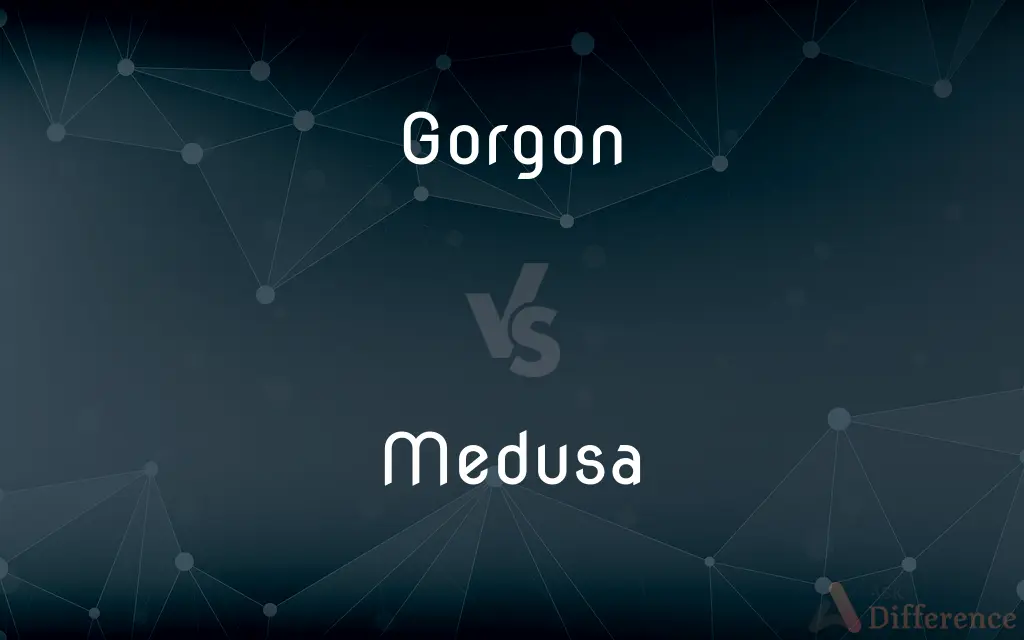Gorgon vs. Medusa — What's the Difference?
By Maham Liaqat & Fiza Rafique — Updated on March 14, 2024
Gorgon refers to a mythical creature in Greek mythology, characterized by hair of living snakes and a gaze that turns onlookers to stone. Medusa, one of the three Gorgons, is unique for being mortal and directly associated with the hero Perseus's tale.

Difference Between Gorgon and Medusa
Table of Contents
ADVERTISEMENT
Key Differences
Gorgons encompass a broader category of mythical entities in Greek mythology, known for their terrifying appearance and bad gaze. Medusa, specifically, stands out as the most famous Gorgon, primarily because of her role in the myth involving her beheading by Perseus.
Medusa's distinctiveness lies in her mortality, unlike her sisters Stheno and Euryale. This aspect made her a target for Perseus, who sought her head to use its petrifying power. The Gorgons, as a group, represent a fearsome otherness, while Medusa's story intertwines closely with human heroes.
While Gorgons are generally depicted as monstrous and inhuman, Medusa's narrative often includes elements of victimhood, particularly in later interpretations where she is transformed into a Gorgon as a curse. This adds a layer of tragedy to Medusa that is not applicable to the collective image of Gorgons.
The origin of Gorgons is subject to various interpretations, with some sources suggesting they were daughters of Phorcys and Ceto, sea gods, indicating a divine or semi-divine lineage. Medusa, on the other hand, while part of this lineage, is often given a more detailed backstory that highlights her transformation from beauty to beast.
Gorgons and Medusa are both integral to the rich tapestry of Greek mythology, yet Medusa’s story is more personal and tragic, making her stand out as a character with depth beyond her monstrous appearance. This contrast between the collective myth of the Gorgons and the individual legend of Medusa illustrates the complexity of Greek mythological characters.
ADVERTISEMENT
Comparison Chart
Definition
A mythical creature with snakes for hair and a petrifying gaze.
The only mortal Gorgon, famous for being slain by Perseus.
Nature
Immortal (except Medusa).
Mortal.
Number
Three in classical mythology: Stheno, Euryale, and Medusa.
One.
Mythological Role
Represent the monstrous and terrifying.
A tragic figure with a detailed backstory involving transformation and victimhood.
Impact on Heroes
Pose a general threat to all who encounter them.
Directly linked to Perseus’s heroic journey.
Compare with Definitions
Gorgon
Mythical beings with the power to petrify with their gaze.
The hero prepared to face the Gorgon, aware of the risk of stone transformation.
Medusa
Once beautiful, cursed to turn onlookers to stone.
Medusa's curse meant that no one could behold her without facing petrification.
Gorgon
Creatures depicted with serpentine hair.
Ancient sculptures often represent Gorgons with snakes writhing atop their heads.
Medusa
A figure of tragedy and transformation.
Medusa’s story is often seen as a tale of unjust punishment and transformation.
Gorgon
Symbols of ultimate terror in Greek mythology.
To the ancient Greeks, encountering a Gorgon was synonymous with facing death.
Medusa
Central to various works of art and literature.
Medusa has inspired countless artists over the centuries, symbolizing various themes.
Gorgon
Represented as female entities.
All known Gorgons in mythology are described as female, emphasizing their otherness.
Medusa
Directly connected to the hero Perseus.
The quest to slay Medusa is a defining moment in the myths surrounding Perseus.
Gorgon
Associated with protection in some contexts.
Gorgon images were used on shields for their petrifying symbolism.
Medusa
In Greek mythology, Medusa (; Ancient Greek: Μέδουσα "guardian, protectress") also called Gorgo, was one of the three monstrous Gorgons, generally described as winged human females with living venomous snakes in place of hair. Those who gazed into her eyes would turn to stone.
Gorgon
A Gorgon (/ˈɡɔːrɡən/; plural: Gorgons, Ancient Greek: Γοργών/Γοργώ Gorgṓn/Gorgṓ) is a creature in Greek mythology. Gorgons occur in the earliest examples of Greek literature.
Medusa
The Gorgon who was killed by Perseus.
Gorgon
Greek Mythology Any of the three sisters Stheno, Euryale, and the mortal Medusa who had snakes for hair and eyes that if looked into turned the beholder into stone.
Medusa
(zoology) A jellyfish; specifically, a non-polyp form of individual cnidarians, consisting of a gelatinous umbrella-shaped bell and trailing tentacles.
Gorgon
Gorgon A woman regarded as ugly or terrifying.
Medusa
(pathology) worm-star
Gorgon
(Greek mythology) A vicious female monster from Greek mythology with sharp fangs and hair of living, venomous snakes. One of the three sisters: Medusa, Stheno and Euryale
Medusa
The Gorgon; or one of the Gorgons whose hair was changed into serpents, after which all who looked upon her were turned into stone.
Gorgon
An intimidating, ugly, or disgusting woman; anything hideous or horrid.
Medusa
Any free swimming acaleph; a jellyfish.
Gorgon
Like a gorgon; very ugly or terrifying.
Medusa
(Greek mythology) a woman transformed into a Gorgon by Athena; she was slain by Perseus
Gorgon
One of three fabled sisters, Stheno, Euryale, and Medusa, with snaky hair and of terrific aspect, the sight of whom turned the beholder to stone. The name is particularly given to Medusa.
Gorgon
Anything very ugly or horrid.
Gorgon
The brindled gnu. See Gnu.
Gorgon
Like a Gorgon; very ugly or terrific; as, a Gorgon face.
Gorgon
(Greek mythology) any of three winged sister monsters and the mortal Medusa who had live snakes for hair; a glance at Medusa turned the beholder to stone
Common Curiosities
What makes Medusa unique among the Gorgons?
Medusa is unique for being mortal and having a more detailed personal myth, involving her transformation and death at the hands of Perseus.
Why was Medusa cursed?
In many versions of the myth, Medusa was cursed by Athena as punishment, leading to her transformation into a Gorgon.
Who are Medusa's sisters?
Medusa's sisters are Stheno and Euryale, both immortal.
Why is Medusa's story still relevant today?
Medusa's story resonates due to its themes of power, victimization, and transformation, appealing to contemporary discussions on similar issues.
Can all Gorgons turn people to stone?
Yes, all Gorgons are said to have the ability to turn anyone who looks into their eyes to stone.
How did Perseus defeat Medusa?
Perseus used a reflective shield to view Medusa indirectly, avoiding her petrifying gaze, and beheaded her.
Are there any modern interpretations of Medusa's story?
Yes, modern interpretations often view Medusa as a victim of divine cruelty and explore themes of injustice and transformation.
Was Medusa always considered a monster?
Initially, Medusa may have been a protective figure before her story evolved into the more familiar tragic narrative.
How are Gorgons depicted in art?
Gorgons are typically depicted with snaky hair, wide mouths, protruding tongues, and sometimes wings.
Did Medusa have any children?
According to some myths, Medusa bore Pegasus and Chrysaor at the moment of her death when Perseus decapitated her.
Did Gorgons exist outside Greek mythology?
While unique to Greek mythology, Gorgons influenced the mythologies and art of other cultures.
Are there any temples or shrines dedicated to Gorgons or Medusa?
While there are no specific temples dedicated to them, images of Gorgons, particularly Medusa, were used in various religious and protective contexts.
What role did Gorgons play in ancient Greek culture?
Gorgons were often used as symbols to ward off evil, appearing on pottery, coins, and buildings.
Share Your Discovery

Previous Comparison
Articulate vs. Communicate
Next Comparison
Celebrity vs. InfluencerAuthor Spotlight
Written by
Maham LiaqatCo-written by
Fiza RafiqueFiza Rafique is a skilled content writer at AskDifference.com, where she meticulously refines and enhances written pieces. Drawing from her vast editorial expertise, Fiza ensures clarity, accuracy, and precision in every article. Passionate about language, she continually seeks to elevate the quality of content for readers worldwide.














































